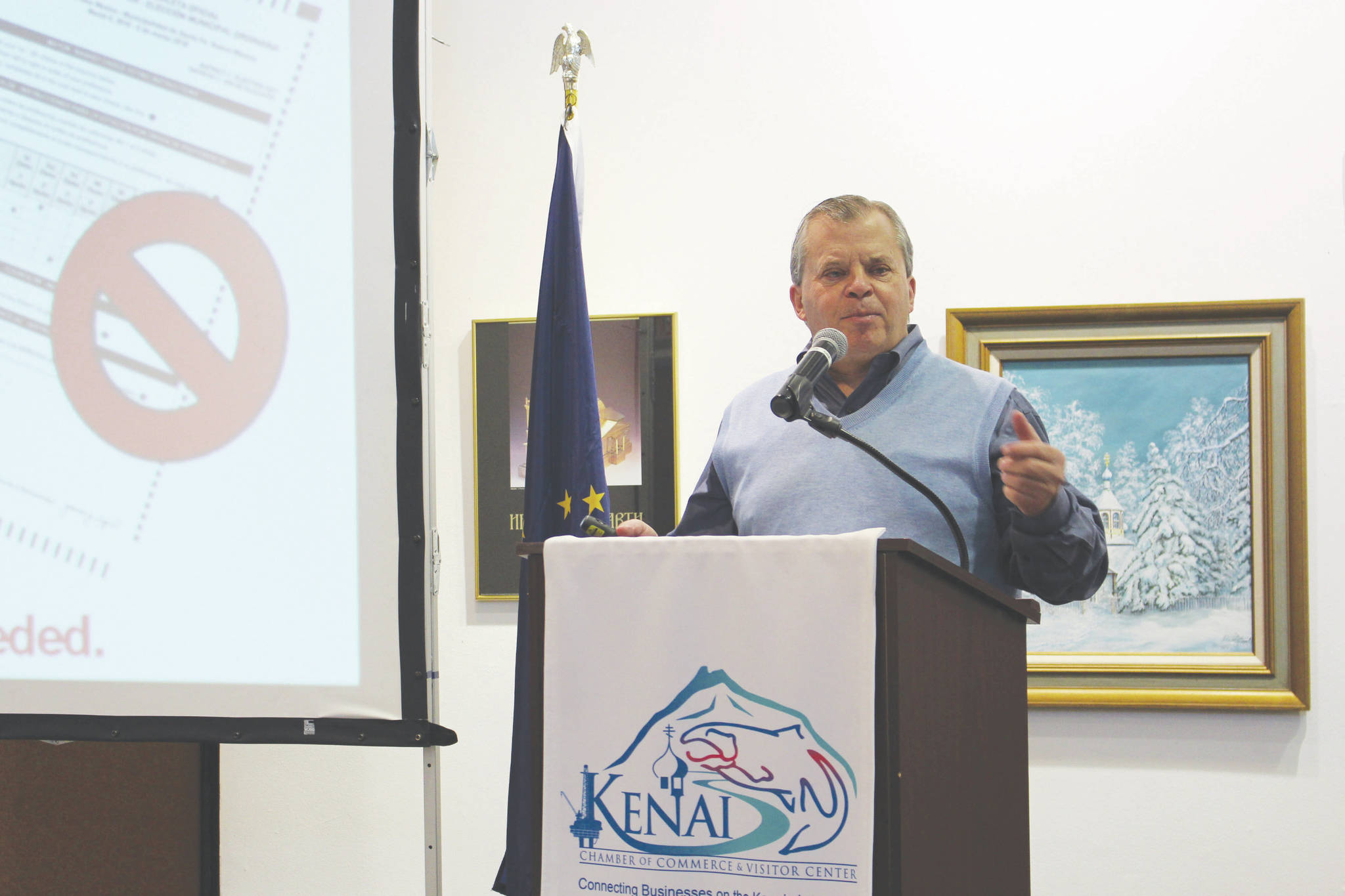With less than a week before the Nov. 3 general election, members of the Kenai and Soldotna Chambers of Commerce heard the arguments for and against Ballot Measure 2 on Wednesday from brothers Mike and Tim Navarre.
“Massachusetts has the Kennedys, Texas has the Bushes,” Merrill Sikorski, who moderated the event, said. “Well, here on the Kenai Peninsula, we have the Navarres.”
Mike Navarre spoke in favor of the ballot measure, which would implement open primaries and ranked-choice voting in Alaska, as well as require more detailed financial disclosures for political spending. Tim Navarre spoke against it.
Watch the presentations at Wednesday’s Chamber Luncheon here or on the Facebook page for the Kenai Chamber of Commerce and Visitor Center.
In his argument in favor of the ballot measure, Mike Navarre said that opening up primary elections in Alaska would lead to less hyper-partisanship and allow for candidates unaffiliated with Democrats or Republicans to have a fairer shot.
“In Alaska, 63% of registered voters choose not to register as either a Democrat or a Republican,” Mike Navarre said. “Sixty three percent. That’s important. Opening up the primary allows us the chance to vote across party lines on both aisles. … It allows us to get beyond the primary system that polarizes elections and candidates to either the hard right or the hard left, and moves us back towards the middle. It gives the power back to the people, rather than strategies and speculators.”
Tim Navarre’s main argument against the ballot measure was that it is supported by “out-of-state billionaires.” He said that 99% of the funding for Alaska for Better Elections, the group supporting the ballot measure, comes from out of state. According to the Oct. 8 independent expenditure report from the Alaska Public Offices Commission, the largest contributors to Alaska for Better Elections between Sept. 28 and Oct. 5 were Unite America, Unite and Renew Fund, Inc.; and Represent.Us, which are based in Colorado, California and Massachusetts respectively.
The top three contributors to Defend Alaska Elections — which is against Ballot Measure 2 — are the Alaska Republican Party, the State Republican Leadership Committee and Club for Growth, according to the group’s website. The State Republican Leadership Committee and Club for Growth are based in Washington, D.C., while the Alaska Republican Party is based in Anchorage.
“This initiative couples together two failed election experiments from the Lower 48 and tries to impose this tangled mess on Alaskan voters,” Navarre said. “So-called ranked-choice voting requires voters to assign a score to every candidate on the ballot or risk having their ballot thrown out. The California-style jungle primary will be imposed on Alaska voters. It throws all candidates into one combined primary and robs them of their ability to select political party nominees to compete against other candidates in the general election.”
After the Navarre brothers made their respective pitches, members of the audience asked them a few questions.
Ballot Measure 2, if it passes, would have the top four candidates of the open primary move on to the general election. At that point, voters would have the option to rank those candidates in order of preference. Al Hull, of Kenai, asked the Navarres if voters would be required to select all four candidates in order for their vote to be counted.
Tim Navarre said that, if you only choose one candidate and that candidate gets the least amount of votes, your ballot is essentially “thrown out” as other people’s second, third and fourth choices are factored in to determine who has more than 50% support. Mike Navarre pushed back on that and said the vote isn’t thrown out, adding that it’s effectively the same as voting for a candidate who ends up with the least amount of votes.
Borough Mayor Charlie Pierce asked why the ballot measure is necessary, arguing that there is nothing “broken” about Alaska’s current election system.
Mike Navarre said he came to support the ballot measure after deciding that Alaska “can do better” when it comes to elections.
“I have seen the hyper-partisanship in Juneau that is a result of primary elections that push candidates to the far right in Republican primaries and to the far left in Democratic primaries,” Mike Navarre said. “It affects the ability for people to work together, to compromise, to come up with cooperation so that we can find the solution.”
After the audience had asked their questions, the Clarion surveyed the crowd by a show of hands to gauge the opinions of those in the room. Only one person, Mike Navarre, said they planned to vote “yes” on Ballot Measure 2. Seven audience members said they were voting “no,” and seven were either unsure or didn’t want to say. No one said that their minds had been changed one way or the other by the presentations.
Reach reporter Brian Mazurek at bmazurek@peninsulaclarion.com.

